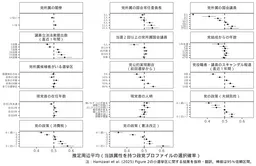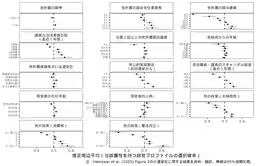

Japanese Voters Prioritize Practical Competence Over Party Experience in Elections
Understanding Japanese Voter Behavior: The Impact of Practical Competence
Recent research sheds light on the preferences of Japanese voters when selecting political parties, revealing a surprising emphasis on practical ability rather than the traditional notion of party experience. In a comprehensive study, conducted by a team including researchers from Waseda University, Meiji University, and the University of Wisconsin-Eau Claire, the dynamics of voter behavior were examined through a conjoint experiment aimed at understanding the various attributes that influence electoral choices.
The Research Insights
The study found that when Japanese voters are considering which political party to support, they weigh not just the alignment of party policies with their own beliefs, but also the perceived practical competencies of the parties, referred to as 'valence attributes'. These include various factors such as the number of party members, legislative productivity, and the absence of scandals. Interestingly, elements like party history and the length of a party leader's tenure were not deemed as critical.
Key Findings
1. Balanced Importance: Both policy alignment and valence play crucial roles in party evaluation. Voters tend to favor parties that match their policy preferences while also demonstrating high practical capability. This preference remains consistent across different electoral systems, be it district-based or proportional representation.
2. Identification of Valence Attributes: From the 11 valence attributes analyzed, the most significant factors included legislative presence, the ability to fulfill electoral promises, and the absence of scandals. Conversely, attributes related to party longevity or past experience were less impactful on voter decision-making.
3. Independence of Attributes: The research also confirmed that high valence does not automatically enhance the importance of policy. Even when a party has a strong valence, a misalignment with voter preferences can lead to decreased support.
4. Insights into Supporter Behavior: Different voter groups showed varied responses to valence attributes. For instance, supporters of the ruling Liberal Democratic Party exhibited a moderate preference for the ratio of experienced politicians, whereas non-affiliated voters reacted more strongly against parties involved in scandals.
Implications for Japanese Politics
These findings provide crucial insights into the ongoing dynamics within Japanese politics, especially with regard to why the Liberal Democratic Party has maintained its dominance. The research suggests that their advantages in practical competence-related valence attributes have significantly influenced their electoral success, despite not always aligning with popular policy preferences.
For opposition parties, the results underscore the importance of enhancing and communicating their practical competencies alongside asserting policy positions, aiming to attract a broader voter base, particularly among undecided voters.
Looking Forward
While this study utilized a novel method to evaluate valence objectively, future research should focus on how real-world dynamics, such as media representation and voter sentiment towards party affiliations, shape perceptions of these attributes. Comparative studies across different political cultures and electoral systems could also yield valuable insights into voter behavior.
In conclusion, as political landscapes continue to evolve, understanding the balance between practical competence and policy alignment will be essential for both incumbents and challengers aiming to navigate the complex arena of Japanese elections effectively.

Topics Other)










【About Using Articles】
You can freely use the title and article content by linking to the page where the article is posted.
※ Images cannot be used.
【About Links】
Links are free to use.